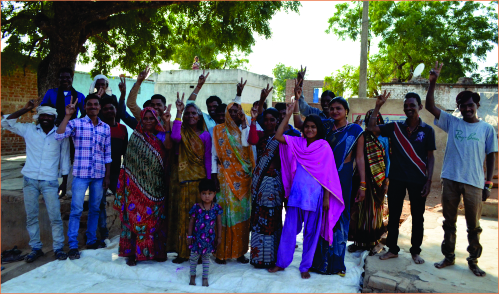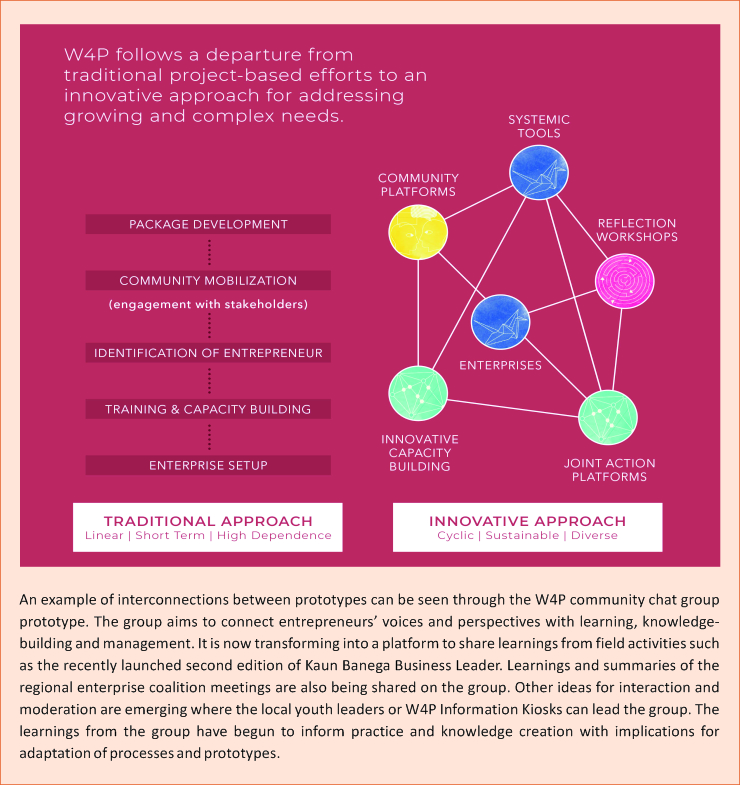|
Interconnected Solutions for Building a Responsive Entrepreneurship Eco System New innovations especially in technology are transforming the world of work. These innovations can be incremental or disruptive. Incremental innovations, improve existing processes and functions, however, their impact is usually limited or isolated in nature . For example, technological advances such as artificial intelligence will create new jobs, but those who lose their jobs in this transition may be the least equipped to seize new opportunities. Disruptive innovations, on the other hand, challenge business-as-usual and transform the way things operate. These innovations introduce interconnected solutions for cross-scale impact. They look at possibilities and opportunities arising from shifts in a complex system to improve the quality of work, expand choices, fix damages inflicted by inequality, and much more.
Initiating processes of disruptive
innovation and change to enable decent and
In social innovation, prototypes respond to the needs and aspirations of the end user. For example, in the case of W4P India, the end users are the rural communities of Eastern Uttar Pradesh and Bundelkhand. Initiating prototypes requires a deep understanding of the local context, which results from piloting the solutions. The pilot phase provides invaluable data on handling local complexities such as opportunities that have the potential to facilitate the desired outcome and forces that have the potential to hinder it. This understanding leads to multiple reiterations in the design and nature of the prototype which is critical to its impact and success.
Through the W4P programme, a number of interconnected prototypes have been initiated – that can respond to each other to influence cross-scale impact, building a system which organically responds to dynamism in the long run. W4P prototypes build such interconnections in the entrepreneurial system by enhancing resource flows, activating relational networks, changing local processes and creating shared narratives. The above example embodies the principle of interconnectedness that allows W4P to build a responsive ecosystem. Actors in the meso sphere are particularly important for facilitating such interconnections between actors in the micro and macro spheres. They play this role by facilitating open platforms that leverage existing opportunities, link the growing number of otherwise isolated innovations and implement solutions that respond to contextualised needs. Interconnected solutions enable the system to translate and adapt global knowledge and opportunities at local scale and in turn strengthen the fabric of the entrepreneurial ecosystem to build a future of work with economic stability and social justice. ■ References
Vrinda Chopra, Stuti Sareen
|
 meaningful job creation
requires a rehaul in the narratives, systems and methodologies applied
within our spheres of work. In practice, this has meant the adoption of
a ‘human centred agenda’ which guides our work under the Work 4 Progress
(W4P) programme . W4P believes in the power of entrepreneurship and
works on strengthening the social contract by placing people and the
work they do at the centre of economic and social policy and business
practice . It aims to introduce interconnected disruptive solutions in
the entrepreneurial ecosystem across India, Mozambique and Peru through
a social innovation methodology; in which it listens to
multi-stakeholder perspectives through dialogue, finds relevant answers
through co-creation, prototypes solutions and shares learning to
accelerate impact at scale.
meaningful job creation
requires a rehaul in the narratives, systems and methodologies applied
within our spheres of work. In practice, this has meant the adoption of
a ‘human centred agenda’ which guides our work under the Work 4 Progress
(W4P) programme . W4P believes in the power of entrepreneurship and
works on strengthening the social contract by placing people and the
work they do at the centre of economic and social policy and business
practice . It aims to introduce interconnected disruptive solutions in
the entrepreneurial ecosystem across India, Mozambique and Peru through
a social innovation methodology; in which it listens to
multi-stakeholder perspectives through dialogue, finds relevant answers
through co-creation, prototypes solutions and shares learning to
accelerate impact at scale. 